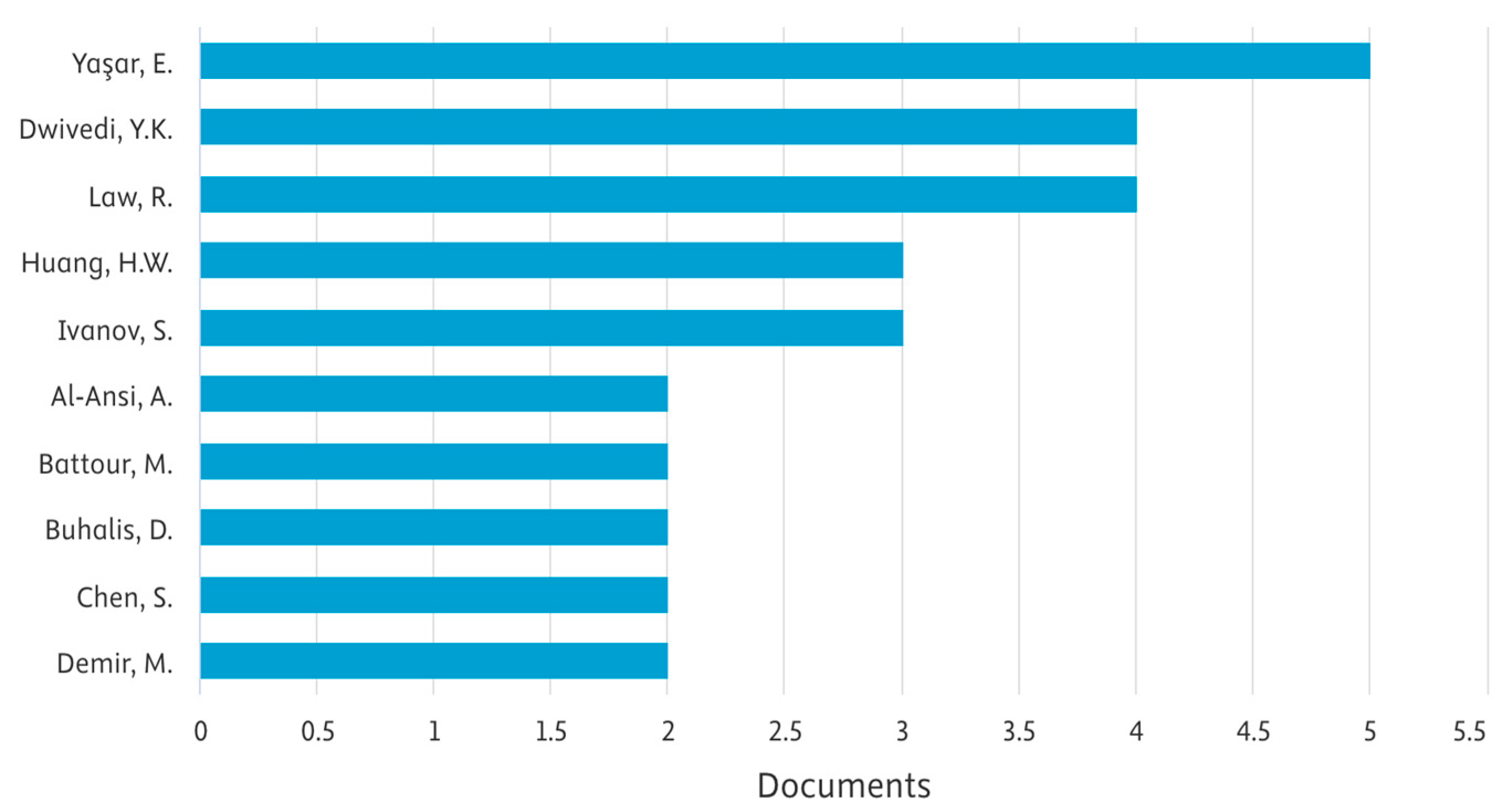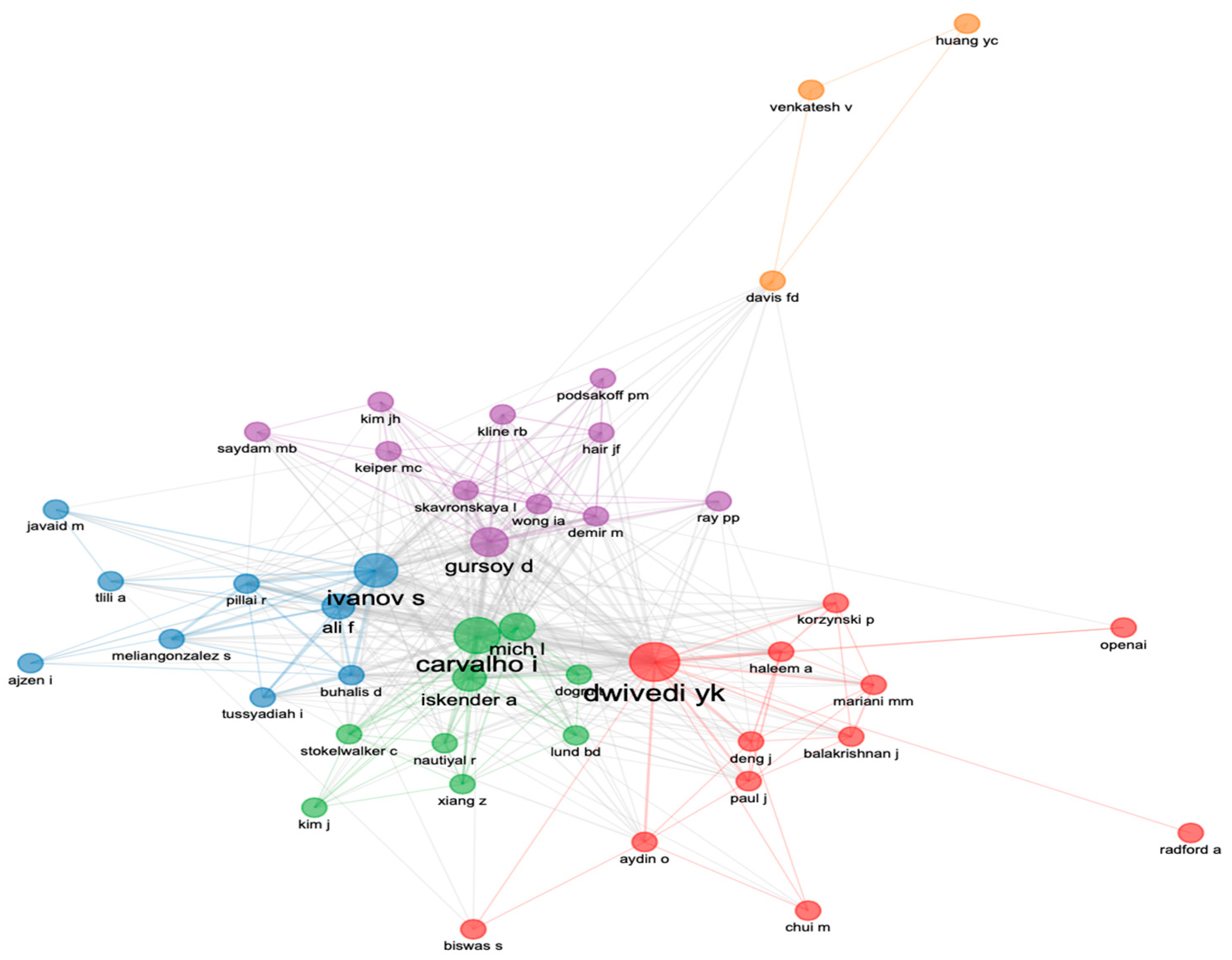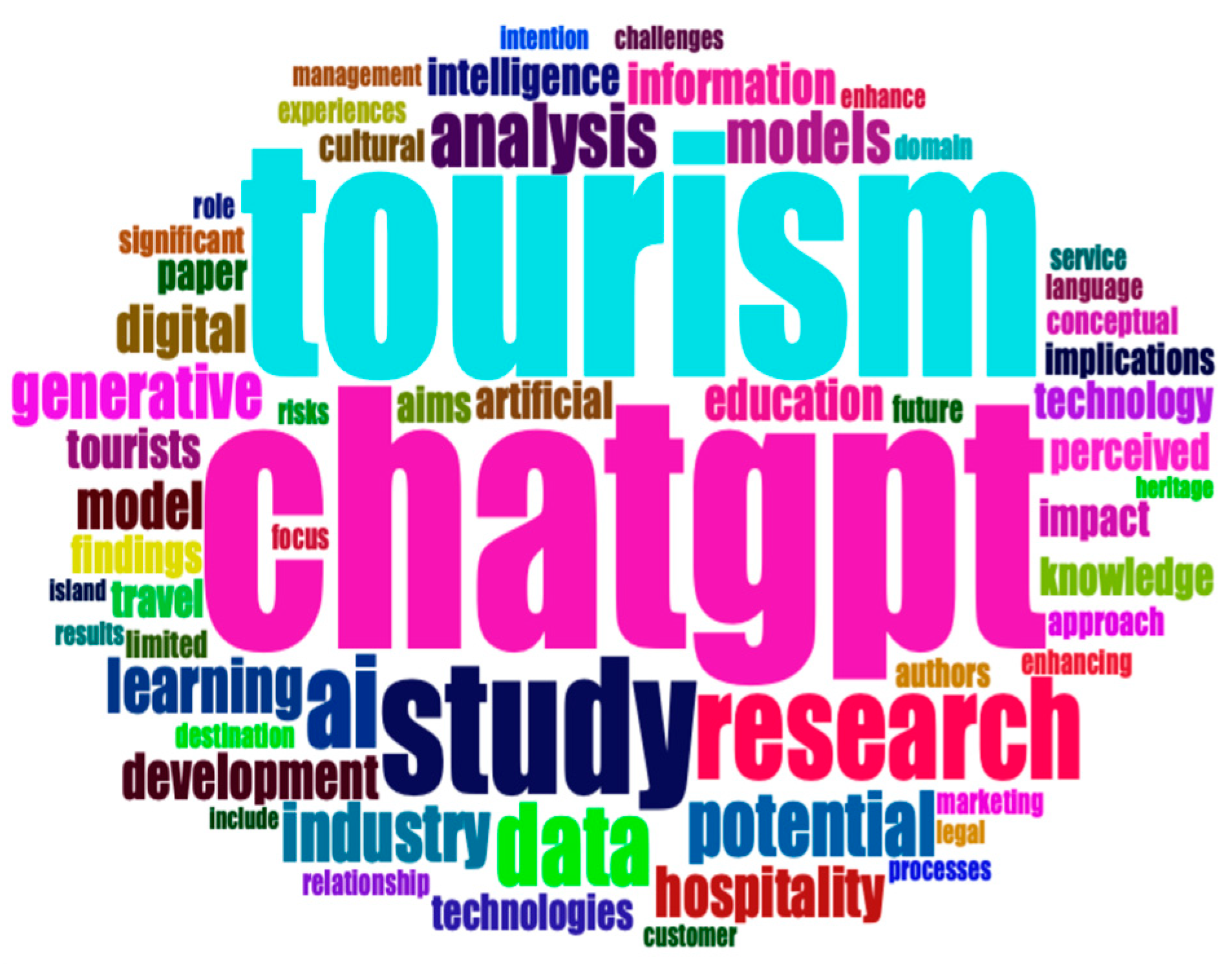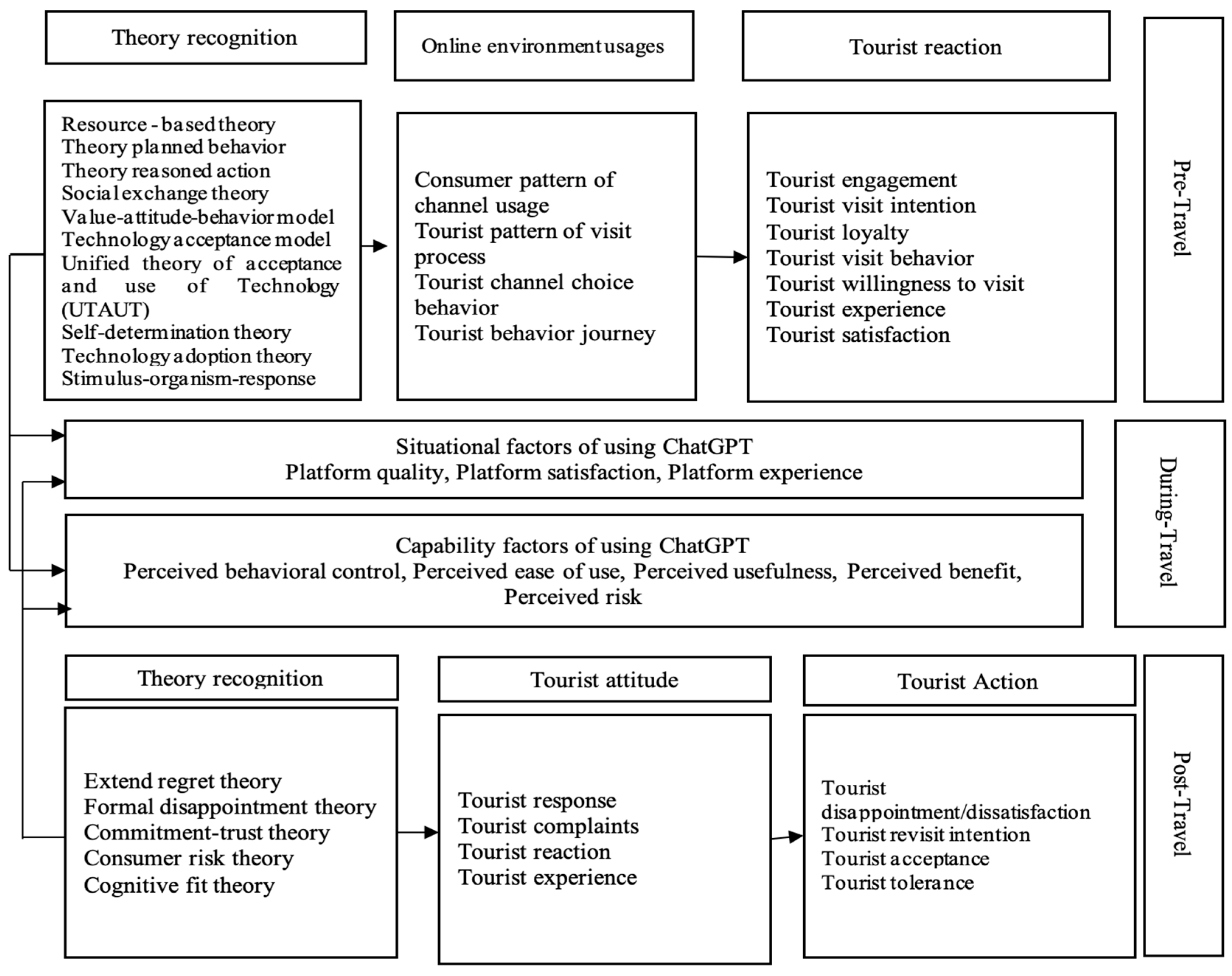1. Introduction
The advancement of technology contributes to the development of education, finance, travel and hospitality, marketing, and tourism, as well as commerce [
1,
2,
3]. As part of information and communications technology (ICT), the Internet has transformed the practice used in the tourism industry since the 1990s [
4]. Extensive networks and smart technology have supported the advancement of technology and its application to the tourism industry including destinations, hotels, airlines, and others to promote products and services to travelers [
5] and also create a competitive edge [
6].
ChatGPT is one of the examples resulting from the advancement of technology, especially in open artificial intelligence (AI). ChatGPT was launched in 2022 and gained traction from academicians and industries [
7]. AI has significantly broadened its capability based on deep learning and language models [
8]. Furthermore, ChatGPT uses data for un-supervised pre-training and supervised fine-tuning to respond to the queries of users on the chatbot and questions in a chat format [
9]. ChatGPT was designed based on a language model with 175 billion parameters. To train it, the datasets of queries from web pages, books, research articles, and social chatters were used [
9].
ChatGPT has been used in education [
10], health [
10], finance [
11], multidiscipline fields [
12], the environment [
13], and the editorial and publishing fields [
14,
15]. ChatGPT is also used in the tourism industry to increase engagement, satisfaction, experience, and efficiency [
16]. However, there are limited studies explaining how tourists’ behavior is predicted from a three-stage perspective using ChatGPT. Therefore, we explored documents published regarding ChatGPT to systemize the findings on the use of ChatGPT in the pre-, during, and post-travel periods. Tourist behavior was analyzed and predicted at three stages using ChatGPT.
Advanced ICT in the tourism industry has changed the tourist experience. ICT has become a part of the tourist experience as tourists use smart devices to plan a trip, experience travel, and post about their experience [
17,
18]. In general, ChatGPT provides tourists with necessary services and contributes to tourism development. Hence, it is essential to integrate advanced ICT tools such as ChatGPT into tourism. To investigate the role of ChatGPT in the tourism industry, challenges and benefits must be considered including experience using ChatGPT. Then, ChatGPT’s impact on tourist behavior can be assessed to predict tourist experience or behavior. In this study, we summarized previous research results on using ChatGPT to analyze tourist behavior and research theories to predict the future research agenda.
The number of publications, word clouds, intellectual patterns, and documents by authors were analyzed to design a framework for research and theories to explore ChatGPT usage from the perspective of behavioral theories. After analyzing the current trends in publications on ChatGPT and the tourism industry and the three stages of visitors’ behavior using ChatGPT, we discussed how the results of this study contribute to the development of the tourism industry.
2. Literature Review
ChatGPT in Tourism
ChatGPT is one of the AI chatbots that significantly impact the tourism and hospitality industry. Tourist behavior, decision-making, and service are affected by using ChatGPT [
19]. ChatGPT is used by travelers in the pre-, during, and post-travel stages. First, in pre-stage travel, ChatGPT is a solution for travelers to use in planning to visit destinations. At this stage, ChatGPT assists travelers in seeking guidance, recommendations, and exploration. ChatGPT guides and explains the booking process when selecting accommodation and transportation and guides travelers to tourism destinations. In pre-stage travel, ChatGPT assists travelers with schedules and destinations.
During travel, ChatGPT assists with traveling by providing various responses. Travelers use ChatGPT as a personal assistance and information source for their destinations. In addition, travelers use ChatGPT to predict crowdedness and travel time [
20]. ChatGPT updates information on attractions, accommodation, and transportation. During travel, the situational factors of using ChatGPT need to be identified for quality, satisfaction, and experience along with perceived behavior, perceived ease of use, perceived usefulness, perceived benefit, and perceived risk. In the post-travel stage, the tourist shares their experience, satisfaction, and behavior, which influence travel decisions [
21]. Their perception of ChatGPT also needs to be researched using theories to explain recognition, tourist attitude, and tourist action.
3. Methods
Bibliometric analysis is used to examine the number of documents used and summarize publications’ content. Recently, bibliometric methods have been used in analyzing research trends around the world [
22,
23]. We used a bibliometric method to analyze studies on ChatGPT and the tourism industry. The number of publications and current trends were analyzed using word clouds. A content analysis was conducted to investigate the relationship between ChatGPT and tourism.
We collected data from the Scopus database, which is one of the most comprehensive sources of scientific documents and is multidisciplinary. We selected the documents related to ChatGPT and tourism by using “ChatGPT and Tourism” as keywords.
In the selection process, the articles published on ChatGPT and tourism on the Scopus database were selected and retracted in 2024. Criteria such as document types and language were applied. Documents published in English were selected, and the total number of documents was 110.
After screening the documents using the titles, abstracts, and contents of the articles, the selected documents were analyzed [
23] to identify research trends in ChatGPT and tourism. Content analysis was used to systematically summarize the documents [
24].
A systematic review is a method for selecting, analyzing, and interpreting documents to classify theories, research results, and content.
We analyzed theories that were applied to the research on ChatGPT and tourism to propose future research agendas. The research agendas of ChatGPT and tourism, especially in tourist behavior in the pre-traveling, during traveling, and post-traveling stages, were clustered to predict tourist behavior, decision-making, and tourist service.
4. Results and Discussions
Descriptive statistics of the number of publications from 2023 to 2024 were obtained. Research trends were categorized based on the search results on the Scopus database. The number of publications on ChatGPT and tourism was also obtained. A total of 110 articles were published as of November 2024, of which 29 were published in 2023, 75 in 2024, and 6 in 2025.
Figure 1 shows that Yasar E. was the most productive author with five documents, followed by Dwivedi Yogesh K. and Law Rob with four documents. These authors contributed to the knowledge of ChatGPT and the tourism industry, including tourism education.
We explored the authors’ intellectual structure networks. The intellectual structure network presented the connection of the documents through co-citation.
Figure 2 shows the significant contributions of documents on intellectual structure networks [
16,
19,
25,
26].
We conducted a co-word analysis to summarize the words used by the authors in their published documents. The authors presented concerns about ChatGPT and the tourism industry. We used ChatGPT, tourism, study, research, and AI as keywords as they were the most discussed. These keywords indicated that ChatGPT is a new technology for society, especially in the tourism industry. In addition, study and research are two keywords that the authors used to explore how ChatGPT contributed to the research. The authors discussed ChatGPT for future research or study directions [
19,
27,
28,
29,
30] and revealed that generative AI such as ChatGPT contributed to studies on the tourism industry to understand the tourist acceptance of ChatGPT, perceived risks with respect to chatbots, and others. The overall word cloud of the articles is displayed in
Figure 3.
5. Discussion
We explored the effects of ChatGPT on the three stages of travelers’ visit behavior. The number of publications referring to ChatGPT and the tourism industry significantly increased from 2023 to 2024 (
Figure 1), and studies on ChatGPT and tourism were predicted to increase in the following year due to the increased interest of authors. Researchers focused on important indicators such as tourism, ChatGPT, analysis, study, research, marketing, and hospitality. These keywords were important in the documents. This aligned with previous studies [
19,
27,
28,
29,
30] which revealed that the generative AI ChatGPT was an important topic to study in the tourism industry to understand the tourist acceptance of ChatGPT and perceived risk with respect to chatbots.
ChatGPT was frequently used by travelers in making decisions regarding their travels in the pre-trip, en route, and post-travel stages [
31]. ChatGPT increased tourists’ satisfaction with its assistance in these travel stages. It also fostered sharing experience and enhanced satisfaction during traveling. The content analysis results showed that the current trend in related studies offered future research agendas for ChatGPT and the tourism industry related to tourist behavior. We clustered future research agendas into those regarding pre-traveling, during traveling, and post-traveling based on the theories of tourism, especially regarding examining tourist behavior in using ChatGPT (
Figure 4).
To explain the recommendation of using ChatGPT in tourism to predict the future research agenda, a framework was constructed.
It is necessary to explore the behavior of tourists using ChatGPT. In addition, ChatGPT affected tourists’ behavior, and it is necessary to clarify theories that can be used in the following studies. Based on recognition theory, which refers to sociological and psychological theories, human social behavior can be studied. Furthermore, visitors’ responses toward ChatGPT in pre-travel play an essential role in examining related theories [
2,
25,
32,
33]. Technology influences psychology immersion and visit intention. Therefore, researchers need to explore which factors impact ChatGPT usage during pre-travel to recognize the presence of the online environment in destinations (
Figure 4).
Researchers explored the situational factor in using ChatGPT with indicators such as platform quality, satisfaction with the platform, and experience using ChatGPT from travelers’ perspectives. In addition, scholars conducted studies on how travelers examined satisfaction, quality, and experience using platforms [
34,
35,
36]. It is necessary to explore situational factors related to ChatGPT.
To examine tourists’ reaction to using ChatGPT during their travels, researchers must study the reactions of tourists after using ChatGPT with indicators such as tourist engagement, tourist visit intention, tourist loyalty, tourist visit behavior, tourist experience, and tourist satisfaction. Tourists’ reactions to each stage in the tourism industry have been researched. Due to the limited results, especially in the context of using ChatGPT, the impact of technology, platforms, and networks for value creation on tourist reaction needs to be researched [
37].
It is necessary to explore the capability factors of using ChatGPT such as perceived behavior control, perceived ease of use, perceived usefulness, perceived benefit, and perceived risk. These factors were studied in the context of technology and tourist behavior [
38] in the perceived behavior control [
2], perceived ease of use or usefulness [
14,
16], and perceived risk [
30,
39,
40]. It is still required to explore the indicators of the capability of using ChatGPT during traveling to determine factors impacting tourist behavior.
Researchers need to study tourists’ attitudes toward tourist action when using ChatGPT in the post-travel stage. It is also necessary to study how tourists respond to positive or negative attitudes while using ChatGPT post-travel. The behaviors in each travel stage are the key to understanding the attitudes and actions of tourists to improve competitiveness from the perspectives of stakeholders and managers. Tourists’ behavior post-travel must be understood using the recognition of attitude toward ChatGPT in the tourism industry. Post-travel is a crucial stage for tourists to build relationships and retention [
41]. Understanding tourist behavior and attitude toward post-travel by using ChatGPT is essential for managers or stakeholders in developing their strategies.
6. Conclusions
ChatGPT enables new ways to research tourism to be developed. Technology in the tourism industry contributes to tourist behavior. Using technology, tourists can plan their travel in the pre-, during, and post-travel stages. ChatGPT increases tourist satisfaction (behavior). The number of publications on ChatGPT and tourism has increased due to the increased interest of researchers. In addition, theory recognition, tourist attitude, and tourist action will be researched in future studies because they influence tourist behavior across the three stages. The results of this study provide information on previous studies on technology, tourism, and tourist behavior. The results can assist stakeholders in better understanding tourist behavior and distinguishing the influence of ChatGPT on tourist behavior. In this study, the Scopus database was used to analyze data, and ChatGPT and tourism were focused on. Therefore, in future studies, more databases such as the Web of Science need to be included to generalize the results of this study.
Author Contributions
Conceptualization, P.P. and L.-W.L.; methodology, P.P.; software, A.K.S.; validation, I.J., A.K.S. and P.P.; formal analysis, L.-W.L.; investigation, L.-W.L.; resources, I.J.; data curation, P.P.; writing—original draft preparation, P.P.; writing—review and editing, A.K.S.; visualization, I.J.; supervision, L.-W.L.; project administration, I.J.; funding acquisition, L.-W.L. All authors have read and agreed to the published version of the manuscript.
Funding
This research was funded by Chaoyang University of Technology, which was instrumental in supporting this research.
Institutional Review Board Statement
Not applicable.
Informed Consent Statement
Not applicable.
Data Availability Statement
The data was retracted from Scopus database.
Conflicts of Interest
The authors declare no conflicts of interest.
References
- Pahrudin, P.; Caraka, R.E.; Liu, L.-W.; Ugiana Gio, P.; Anita Yunikawati, N.; Pardamean, B. Exploring Features and Products in E-Commerce on Consumers Behavior Using Cognitive Affective. IEEE Access 2025, 13, 63774–63791. [Google Scholar] [CrossRef]
- Liu, L.-W.; Wang, C.-C.; Pahrudin, P.; Royanow, A.F.; Lu, C.; Rahadi, I. Does virtual tourism influence tourist visit intention on actual attraction? A study from tourist behavior in Indonesia. Cogent Soc. Sci. 2023, 9, 2240052. [Google Scholar] [CrossRef]
- Pahrudin, P.; Hsieh, T.-H.; Liu, L.-W. Information, Communication, and Technology in the Field of Tourism and Hospitality: A Bibliometric Approach. Eng. Proc. 2023, 38, 4. [Google Scholar]
- Buhalis, D. eTourism: Information Technology for Strategic Tourism Management; Pearson Education: Hoboken, NJ, USA, 2003; ISBN 0582357403. [Google Scholar]
- Buhalis, D. Technology in tourism-from information communication technologies to eTourism and smart tourism towards ambient intelligence tourism: A perspective article. Tour. Rev. 2019, 75, 267–272. [Google Scholar] [CrossRef]
- Law, R.; Leung, R.; Lo, A.; Leung, D.; Fong, L.H.N. Distribution channel in hospitality and tourism: Revisiting disintermediation from the perspectives of hotels and travel agencies. Int. J. Contemp. Hosp. Manag. 2015, 27, 431–452. [Google Scholar] [CrossRef]
- Haleem, A.; Javaid, M.; Singh, R.P. An era of ChatGPT as a significant futuristic support tool: A study on features, abilities, and challenges. BenchCouncil Trans. Benchmarks Stand. Eval. 2023, 2, 100089. [Google Scholar] [CrossRef]
- Radford, A.; Narasimhan, K.; Salimans, T.; Sutskever, I. Improving Language Understanding by Generative Pre-Training; OpenAI: San Francisco, CA, USA, 2018. [Google Scholar]
- Dwivedi, Y.K.; Kshetri, N.; Hughes, L.; Slade, E.L.; Jeyaraj, A.; Kar, A.K.; Baabdullah, A.M.; Koohang, A.; Raghavan, V.; Ahuja, M. “So what if ChatGPT wrote it?” Multidisciplinary perspectives on opportunities, challenges and implications of generative conversational AI for research, practice and policy. Int. J. Inf. Manag. 2023, 71, 102642. [Google Scholar] [CrossRef]
- Fijačko, N.; Gosak, L.; Štiglic, G.; Picard, C.T.; Douma, M.J. Can ChatGPT pass the life support exams without entering the American heart association course? Resuscitation 2023, 185, 109732. [Google Scholar] [CrossRef]
- Dowling, M.; Lucey, B. ChatGPT for (finance) research: The Bananarama conjecture. Financ. Res. Lett. 2023, 53, 103662. [Google Scholar] [CrossRef]
- Homolak, J. Opportunities and risks of ChatGPT in medicine, science, and academic publishing: A modern Promethean dilemma. Croat. Med. J. 2023, 64, 1–3. [Google Scholar] [CrossRef]
- Biswas, S.S. Potential Use of Chat GPT in Global Warming. Ann. Biomed. Eng. 2023, 51, 1126–1127. [Google Scholar] [CrossRef] [PubMed]
- Hu, G. Challenges for Enforcing Editorial Policies on AI-generated Papers. Account. Res. 2023, 31, 978–980. [Google Scholar] [CrossRef] [PubMed]
- Tang, G. Letter to Editor: Academic journals should clarify the proportion of NLP-generated content in papers. Account. Res. 2023, 31, 1242–1243. [Google Scholar] [CrossRef] [PubMed]
- Carvalho, I.; Ivanov, S. ChatGPT for tourism: Applications, benefits and risks. Tour. Rev. 2024, 79, 290–303. [Google Scholar] [CrossRef]
- Tussyadiah, I.P.; Fesenmaier, D.R. Mediating tourist experiences: Access to places via shared videos. Ann. Tour. Res. 2009, 36, 24–40. [Google Scholar] [CrossRef]
- Wang, D.; Park, S.; Fesenmaier, D.R. The role of smartphones in mediating the touristic experience. J. Travel Res. 2012, 51, 371–387. [Google Scholar] [CrossRef]
- Gursoy, D.; Li, Y.; Song, H. ChatGPT and the hospitality and tourism industry: An overview of current trends and future research directions. J. Hosp. Mark. Manag. 2023, 32, 579–592. [Google Scholar] [CrossRef]
- Sudirjo, F.; Diawati, P.; Riady, Y.; Ausat, A.M.A.; Suherlan, S. The Role of ChatGPT in Enhancing the Information Search and Decision-Making Process of Travellers. J. Minfo Polgan 2023, 12, 500–507. [Google Scholar] [CrossRef]
- Nair, V.K.; Chandana Nair, B.R.; Anupama, K.; Ajayan, C. Tech Meets Transcendence: ChatGPT and the Next Chapter of Spiritual Tourism BT. In Navigating the Technological Tide: The Evolution and Challenges of Business Model Innovation; Alareeni, B., Hamdan, A., Eds.; Springer Nature: Cham, Switzerland, 2024; pp. 100–114. [Google Scholar]
- Nawaz, K.; Aslam, T.; Saeed, H.A. A Bibliometric Analysis of International Journal of Sports Marketing & Sponsorship. Int. J. Bus. Psychol. 2020, 2, 45–60. [Google Scholar]
- Sharma, G.; Lijuan, W. The effects of online service quality of e-commerce Websites on user satisfaction. Electron. Libr. 2015, 33, 468–485. [Google Scholar] [CrossRef]
- Krippendorff, K. Content Analysis: An Introduction to Its Methodology; Sage Publications: Thousand Oaks, CA, USA, 2018; ISBN 1506395678. [Google Scholar]
- Dwivedi, Y.K.; Pandey, N.; Currie, W.; Micu, A. Leveraging ChatGPT and other generative artificial intelligence (AI)-based applications in the hospitality and tourism industry: Practices, challenges and research agenda. Int. J. Contemp. Hosp. Manag. 2023, 36, 1–12. [Google Scholar] [CrossRef]
- Iskender, A. Holy or unholy? Interview with open AI’s ChatGPT. Eur. J. Tour. Res. 2023, 34, 3414. [Google Scholar] [CrossRef]
- Rather, R.A. AI-powered ChatGPT in the hospitality and tourism industry: benefits, challenges, theoretical framework, propositions and future research directions. Tour. Recreat. Res. 2025, 50, 652–662. [Google Scholar] [CrossRef]
- Shin, H.; Kang, J. Bridging the gap of bibliometric analysis: The evolution, current state, and future directions of tourism research using ChatGPT. J. Hosp. Tour. Manag. 2023, 57, 40–47. [Google Scholar] [CrossRef]
- Paul, J.; Ueno, A.; Dennis, C. ChatGPT and consumers: Benefits, pitfalls and future research Agenda. Int. J. Consum. Stud. 2023, 47, 1213–1225. [Google Scholar] [CrossRef]
- Battour, M.; Salaheldeen, M.; Mady, K.; Ratnasari, R.T. ChatGPT and Halal Travel: An Overview of Current Trends and Future Research Directions. In AI in Business: Opportunities and Limitations: Volume 1; Springer: Cham, Switzerland, 2024; pp. 23–31. [Google Scholar]
- Wong, I.A.; Lian, Q.L.; Sun, D. Autonomous travel decision-making: An early glimpse into ChatGPT and generative AI. J. Hosp. Tour. Manag. 2023, 56, 253–263. [Google Scholar] [CrossRef]
- Tsai, S. Investigating metaverse marketing for travel and tourism. J. Vacat. Mark. 2024, 30, 479–488. [Google Scholar] [CrossRef]
- Chung, N.; Han, H.; Joun, Y. Tourists’ intention to visit a destination: The role of augmented reality (AR) application for a heritage site. Comput. Hum. Behav. 2015, 50, 588–599. [Google Scholar] [CrossRef]
- Memarzadeh, F.; Blum, S.C.; Adams, C. Business travelers’ intention to purchase: The application of technology acceptance model (TAM). J. Qual. Assur. Hosp. Tour. 2016, 17, 412–424. [Google Scholar] [CrossRef]
- Man, S.S.; Guo, Y.; Chan, A.H.S.; Zhuang, H. Acceptance of online mapping technology among older adults: Technology acceptance model with facilitating condition, compatibility, and self-satisfaction. ISPRS Int. J. Geo-Inf. 2022, 11, 558. [Google Scholar] [CrossRef]
- Assaker, G. Age and gender differences in online travel reviews and user-generated-content (UGC) adoption: Extending the technology acceptance model (TAM) with credibility theory. J. Hosp. Mark. Manag. 2020, 29, 428–449. [Google Scholar] [CrossRef]
- Ozer, L.; Gultekin, B. Pre-and post-purchase stage in impulse buying: The role of mood and satisfaction. J. Retail. Consum. Serv. 2015, 22, 71–76. [Google Scholar] [CrossRef]
- Solomovich, L.; Abraham, V. Exploring the influence of ChatGPT on tourism behavior using the technology acceptance model. Tour. Rev. 2024; ahead-of-print. [Google Scholar] [CrossRef]
- Yi, J.; Yuan, G.; Yoo, C. The effect of the perceived risk on the adoption of the sharing economy in the tourism industry: The case of Airbnb. Inf. Process. Manag. 2020, 57, 102108. [Google Scholar] [CrossRef]
- Sadiq, M.; Dogra, N.; Adil, M.; Bharti, K. Predicting online travel purchase behavior: The role of trust and perceived risk. J. Qual. Assur. Hosp. Tour. 2022, 23, 796–822. [Google Scholar] [CrossRef]
- Shavitt, S.; Barnes, A.J. Culture and the consumer journey. J. Retail. 2020, 96, 40–54. [Google Scholar] [CrossRef]
| Disclaimer/Publisher’s Note: The statements, opinions and data contained in all publications are solely those of the individual author(s) and contributor(s) and not of MDPI and/or the editor(s). MDPI and/or the editor(s) disclaim responsibility for any injury to people or property resulting from any ideas, methods, instructions or products referred to in the content. |
© 2025 by the authors. Licensee MDPI, Basel, Switzerland. This article is an open access article distributed under the terms and conditions of the Creative Commons Attribution (CC BY) license (https://creativecommons.org/licenses/by/4.0/).










